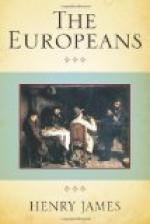obligations required a readjustment of that sense
of responsibility which constituted its principal
furniture. To consider an event, crudely and baldly,
in the light of the pleasure it might bring them was
an intellectual exercise with which Felix Young’s
American cousins were almost wholly unacquainted,
and which they scarcely supposed to be largely pursued
in any section of human society. The arrival
of Felix and his sister was a satisfaction, but it
was a singularly joyless and inelastic satisfaction.
It was an extension of duty, of the exercise of the
more recondite virtues; but neither Mr. Wentworth,
nor Charlotte, nor Mr. Brand, who, among these excellent
people, was a great promoter of reflection and aspiration,
frankly adverted to it as an extension of enjoyment.
This function was ultimately assumed by Gertrude Wentworth,
who was a peculiar girl, but the full compass of whose
peculiarities had not been exhibited before they very
ingeniously found their pretext in the presence of
these possibly too agreeable foreigners. Gertrude,
however, had to struggle with a great accumulation
of obstructions, both of the subjective, as the metaphysicians
say, and of the objective, order; and indeed it is
no small part of the purpose of this little history
to set forth her struggle. What seemed paramount
in this abrupt enlargement of Mr. Wentworth’s
sympathies and those of his daughters was an extension
of the field of possible mistakes; and the doctrine,
as it may almost be called, of the oppressive gravity
of mistakes was one of the most cherished traditions
of the Wentworth family.
“I don’t believe she wants to come and
stay in this house,” said Gertrude; Madame Munster,
from this time forward, receiving no other designation
than the personal pronoun. Charlotte and Gertrude
acquired considerable facility in addressing her,
directly, as “Eugenia;” but in speaking
of her to each other they rarely called her anything
but “she.”
“Does n’t she think it good enough for
her?” cried little Lizzie Acton, who was always
asking unpractical questions that required, in strictness,
no answer, and to which indeed she expected no other
answer than such as she herself invariably furnished
in a small, innocently-satirical laugh.
“She certainly expressed a willingness to come,”
said Mr. Wentworth.
“That was only politeness,” Gertrude rejoined.
“Yes, she is very polite—very polite,”
said Mr. Wentworth.
“She is too polite,” his son declared,
in a softly growling tone which was habitual to him,
but which was an indication of nothing worse than a
vaguely humorous intention. “It is very
embarrassing.”
“That is more than can be said of you, sir,”
said Lizzie Acton, with her little laugh.
“Well, I don’t mean to encourage her,”
Clifford went on.
“I ’m sure I don’t care if you do!”
cried Lizzie.
“She will not think of you, Clifford,”
said Gertrude, gravely.




